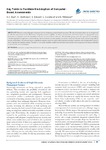Key points to facilitate the adoption of computer-based assessments.
| dc.contributor.author | Burr, Steven | |
| dc.contributor.author | Chatterjee, Arunangsu | |
| dc.contributor.author | Gibson, S | |
| dc.contributor.author | Coombes, L | |
| dc.contributor.author | Wilkinson, S | |
| dc.date.accessioned | 2016-09-20T23:05:31Z | |
| dc.date.available | 2016-09-20T23:05:31Z | |
| dc.date.issued | 2016-06-16 | |
| dc.identifier.issn | 2382-1205 | |
| dc.identifier.issn | 2382-1205 | |
| dc.identifier.uri | http://hdl.handle.net/10026.1/5466 | |
| dc.description.abstract |
here are strong pedagogical arguments in favor of adopting computer-based assessment. The risks of technical failure can be managed and are offset by improvements in cost-effectiveness and quality assurance capability. Academic, administrative, and technical leads at an appropriately senior level within an institution need to be identified, so that they can act as effective advocates. All stakeholder groups need to be represented in undertaking a detailed appraisal of requirements and shortlisting software based on core functionality, summative assessment life cycle needs, external compatibility, security, and usability. Any software that is a candidate for adoption should be trialed under simulated summative conditions, with all stakeholders having a voice in agreeing the optimum solution. Transfer to a new system should be carefully planned and communicated, with a programme of training established to maximize the success of adoption. | |
| dc.format.extent | 77-77 | |
| dc.format.medium | Electronic-eCollection | |
| dc.language | en | |
| dc.language.iso | en | |
| dc.publisher | SAGE Publications | |
| dc.subject | assessment | |
| dc.subject | computer-based | |
| dc.subject | electronic | |
| dc.subject | life cycle | |
| dc.subject | options appraisal | |
| dc.title | Key points to facilitate the adoption of computer-based assessments. | |
| dc.type | journal-article | |
| dc.type | article | |
| plymouth.author-url | https://www.ncbi.nlm.nih.gov/pubmed/29349322 | |
| plymouth.volume | 3 | |
| plymouth.publisher-url | http://www.la-press.com/article.php?article_id=5694 | |
| plymouth.publication-status | Published | |
| plymouth.journal | Journal of Medical Education and Curricular Development | |
| dc.identifier.doi | 10.4137/JMECD.S20379 | |
| plymouth.organisational-group | /Plymouth | |
| plymouth.organisational-group | /Plymouth/Faculty of Health | |
| plymouth.organisational-group | /Plymouth/Faculty of Health/Peninsula Medical School | |
| plymouth.organisational-group | /Plymouth/REF 2021 Researchers by UoA | |
| plymouth.organisational-group | /Plymouth/REF 2021 Researchers by UoA/UoA23 Education | |
| plymouth.organisational-group | /Plymouth/Research Groups | |
| plymouth.organisational-group | /Plymouth/Research Groups/Institute of Health and Community | |
| plymouth.organisational-group | /Plymouth/Users by role | |
| plymouth.organisational-group | /Plymouth/Users by role/Academics | |
| dc.publisher.place | United States | |
| dcterms.dateAccepted | 2016-02-15 | |
| dc.identifier.eissn | 2382-1205 | |
| dc.rights.embargoperiod | No embargo | |
| rioxxterms.versionofrecord | 10.4137/JMECD.S20379 | |
| rioxxterms.licenseref.uri | http://www.rioxx.net/licenses/all-rights-reserved | |
| rioxxterms.licenseref.startdate | 2016-06-16 | |
| rioxxterms.type | Journal Article/Review |


